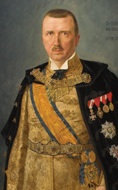Bruker:Mbakkel2/sandkasse13
Bans in Austria-Hungary
[rediger | rediger kilde]Unionistička stranka Narodna stranka
| Bilde | Navn (født-død) |
Embetstid | Parti | Ref. | ||
|---|---|---|---|---|---|---|
| Ban Kraljevine Hrvatske, Slavonije i Dalmacije | ||||||

|
Levin Rauch (1819–1890) Fungerende ban 27.juni 1867–8. desember 1868 |
8. desember 1868–26. januar 1871 | Unionistička stranka | |||

|
Koloman Bedeković (1818–1889) |
26. januar 1871–12. februar 1872 | Unionistička stranka | |||

|
Antun Vakanović (1808–1894) Fungerende ban |
17. februar 1872–20. september 1873 | Unionistička stranka | |||

|
Ivan Mažuranić [a] (1814–1890) |
20. september 1873–21. februar 1880 | Narodna stranka | |||
| Ladislav Pejačević (1824–1901) |
21. februar 1880–4. september 1883 | Unionistička stranka | ||||
|
|Hermann Ramberg
(1820–1899)
|4 September 1883
|1 December 1883
|align="left"|Acting ban
|-
|
(1849–1918)
|4 December 1883
|27 June 1903
|align="left"|Khuen's reign was marked by strong Magyarization. After a series of riots broke out against him in 1903, Khuen was relieved of his duty and appointed prime minister of Hungary.
|-
|
(1855–1928)
|1 July 1903
|26 June 1907
|align="left"|At the beginning of the 20th century, he was faced with a new direction of Croatian policy marked by political alliance between Croats and Serbs in Austria-Hungary for mutual benefit. A Croat-Serb Coalition was formed in 1905, and it governed the Croatian lands from 1906 until the dissolution of the Dual Monarchy in 1918. As Pejačević supported the ruling Coalition in its resistance towards the Hungarian request in 1907 to make the Hungarian language an official language on railways in Croatia, he was forced to resign.
|-
| 
(1848–1924)
| 26 June 1907
| 8 January 1908
|
|-
| 
(1865–1933)
| 8 January 1908
| 5 February 1910
|align="left"|From the very beginning of Rauch's rule, the Croato-Serbian Coalition announced that it would refuse to co-operate in any manner with the new unionist ban.[1] After the Croatian Parliament had been disbanded on 12 March 1908, because of its refusal to co-operate and the insults it directed at the ban, Pavao Rauch ruled through decrees and civil servants. Despite all opposition predictions, Rauch remained in power for two years. On 5 February 1910, he received the king's letter of dismissal.
|-
|
(1864–1918)
|5 February 1910
|19 January 1912
|-
|
(1851–1931)
|19 January 1912
|21 July 1913
|align="left"|He was appointed in January 1912, when anti-Habsburg sentiments were on the rise in Croatia, often manifesting in sympathies for Serbia and calls for creation of a Yugoslav state. Cuvaj tried to curb those trends by series of decrees directed at curbing the freedom of the press, limiting rights of assembly and local autonomy. This created a backlash in the form of strikes and demonstrations. Some young radicals even engaged in terrorism. Cuvaj himself was target of two assassination attempts in 1912.
|-
| rowspan="2" | 
(1873–1951)
| rowspan="2" | 27 November 1913
| rowspan="2" | 29 June 1917
| rowspan="2" align="left" |Skerlecz managed to reconvene the Croatian Parliament in Zagreb by 1915. The Croats made further demands for local authority, as well as unification of Croatia-Slavonia with Dalmatia and Bosnia and Herzegovina.
|-
| rowspan="2" bgcolor=#EEEEEE|Charles IV
(1916–1919)
|-
|
(1868–1949)
| 29 June 1917
| 20 January 1919
|
|}
Provinsen Kroatia og Slavonia 1918–1922
[rediger | rediger kilde]
Siteringsfeil: <ref>-merker finnes for gruppenavnet «lower-alpha», men ingen <references group="lower-alpha"/>-merking ble funnet
